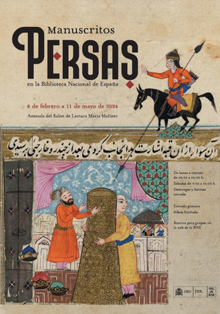Until 11 May, the exhibition Persian Manuscripts in the National Library of Spain ( BNE) will be on display in the antechamber of the María Moliner Reading Room in the Biblioteca Nacional de España ( BNE). On Tuesday 9 April at 4.15 pm, curator Fernando Escribano will be giving a guided tour of the exhibition. It is necessary to confirm your attendance in advance with the subject BNE exhibition visit at: biblio.islamica@aecid.es. Please be at the main staircase of the building 5 minutes beforehand.
Cultural relations between Spain and Persia throughout history have been much more fruitful than one might think, and the collections held by the Biblioteca Nacional de España (BNE) are a good reflection of this.
The BNE’s collection of Persian manuscripts is little known and yet surprising, either for the beauty of its illustrations or for the history behind them. Similarly, the contacts between different Persian Shahs and different Spanish kings or governments in the 15th, 17th and 19th centuries, who left spectacular manuscripts and publications that are also preserved in the BNE, are not often taken into account. These journeys are known by the texts that emanated from them, and many of their original manuscripts or absolutely unique pieces are in the BNE, and will be shown in this exhibition. These books and manuscripts are the history of these contacts.
The Persian world has a very special way of illustrating and editing its texts, which in its most important books are wrapped in unique bindings. These writings, written in Persian or Arabic, are often accompanied by miniatures that make each page a work of art.
This exhibition explores and appreciates the history behind these manuscripts. Visitors are shown where they come from, who made them, and what history they tell, both the history of the text itself and the history narrated in the writings, and are seduced by the beauty of the drawings. The charm of these manuscripts, of the miniatures that illustrate stories and narratives, is sometimes little known in the West, despite the fact that they have been with us for many centuries.







